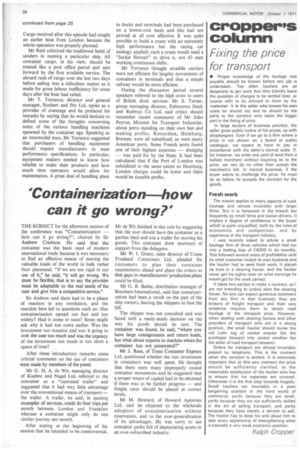cropper's column
Page 38

If you've noticed an error in this article please click here to report it so we can fix it.
Fixing the price for transport
• Proper knowledge of the haulage rate payable should be known before any job is undertaken. Too often hauliers are so desperate to get work that they blandly leave the question of charges to be settled later, or (worse still) to be advised to them by the customer. It is the seller who knows his own costs (or should do) and he should be the party to the contract who takes the bigger part in the fixing of price.
In large sectors of business practice, the seller gives public notice of his prices, as with shopkeepers. Even if we go to a firm where a price is not shown on a board or public catalogue, we expect to have to pay in accordance with the seller's normal scale. If, for instance, we order one yard of sand from a ballast merchant without inquiring as to the price, we can do no other than accept the merchant's bill. In normal business, if the buyer wants to challenge the price, he must do so before he accepts the contract for the goods.
Fresh work
The maxim applies to many aspects of road haulage and almost invariably with larger firms. But it is honoured in the breach too frequently by small firms and owner-drivers. It implies a degree of confidence in the buyer which is quite unjustified, both by the rules of economics and cortipetition, and by experience in the transport industry.
I was recently asked to advise a small haulage firm of three vehicles which had run into a trading loss of £4000 in six months. This followed several years of profitability until its chief customer closed its own business and the haulier had to seek fresh work. It placed its trust in a clearing house, and the haulier never got his sights clear on what earnings he would get for the work carried.
It takes two parties to make a contract, so I am not intending to unduly slam the clearing house. No one can expect generous treatment from any firm in that business; they are brokers of freight transport and their very existence requires them to obtain road haulage at the cheapest price. However, when dealing with clearing houses and other providers of transport who are in a• strong position, the, small haulier should revise the old Latin tag of caveat emptor (let the purchaser beware) into caveat venditor (let the seller of road transport beware).
Orders for transport are almost invariably passed by telephone. This is the moment when the contract is settled. It is extremely important that at this very moment the price should be sufficiently clarified, to the reasonable satisfaction of the haulier who has to ensure that his expenses are covered. Otherwise it is the first step towards tragedy. Small hauliers are inevitably in a poor bargaining position in the hard world of commerce, partly because they are small, partly because they are not sufficiently skilled in the art of selling transport, and partly because they have merely a service to sell. The haulier has to keep his wits about him to take every opportunity of strengthening what is basically a very weak economic position.
Ralph Cropper


















































































































